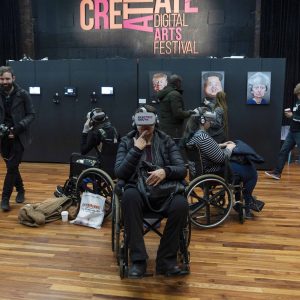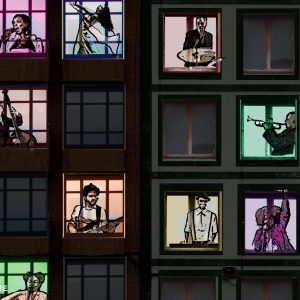Covid-19 an opportunity to reinvent arts education
The coronavirus pandemic is forcing many forms of education online, but for the Market Theatre Lab it’s a chance to rethink the way training for a career in the arts is perceived.
Author:
24 April 2020

Like other forms of teaching and learning, theatre training is being forced to change as education moves online to adhere to the government’s Covid-19 lockdown measures in South Africa. But for Market Theatre Laboratory head Clara Vaughan, it was important to put the humanity of the students before the teaching, and for the teaching to become an interim measure to support the students during this difficult time.
“The purpose of our online resources is to offer something creative to do, opportunities for self-development and reflection, and a distraction from the difficulties many are experiencing, rather than to try and replace the training that is offered live,” Vaughan says.
The presence of the Market Theatre Lab in arts education is about responding to the needs of the disadvantaged. This matters more now as Covid-19 leaves the impoverished and working class more vulnerable. Preparation for the Market Theatre Laboratory’s digital teaching included buying students sim cards with preloaded data, so they could access video content and interact live online.
Related article:
The transition to digital learning is not easy. Second year student Moagi Kai, who went home to Mahikeng when the Market Theatre Lab closed its programmes after President Cyril Ramaphosa declared a national disaster, says he is struggling.
“I’m working from a full house, which has its challenges. Poor network hinders connection. Our data package is for nighttime usage, so we have to catch up with multiple video content at night after doing the work in the day,” Kai says.
“I’m the kind of student that asks a lot of questions, so I feel restricted because online classes are shorter and I don’t want to take the next student’s time. I don’t know how we’re going to do our rehearsals as an ensemble.”
Related article:
This is not the first time the Market Theatre Lab has explored the digital space in the creation of work, but the context differs. In Babylon Beyond Borders (2019), the Lab collaborated with New York’s Harlem Stage, Sao Paulo’s Pequeno Ato and London’s Bush Theatre in a groundbreaking project that saw the four theatres create thematically linked works that were staged simultaneously via live streaming for local, international and online audiences.
Experimentation is part of the ethos of the learning the Lab provides. The notion of a laboratory is taken seriously and characterises much of its teaching methods where practice informs theory.
Rooted in access
Barney Simon and John Kani founded the Lab in 1989 as the educational arm of the Market Theatre, with a special commitment to giving opportunities to, as Kani puts it, “young people who had fallen through the cracks of apartheid and have been victims of Bantu education”.
It has produced prominent theatre makers who have gone on to significantly shape the industry, such as Mncedisi Shabangu, Omphile Molusi and Monageng Motshabi. That there are more men on the list of the Lab’s alumni is connected to society’s slowly changing systemic inequalities, which exclude women across the board.
However, a legacy of the Lab is access, which as the Fees Must Fall movement tells us remains an important and relevant issue. The lack of arts education in under-resourced schools is also a problem.

Hamish Neill, the project director at Wits University’s postgraduate Drama For Life (DFL) arts education programme, has access to on-the-ground data around the state of arts education in schools through the DFL’s Mvuso Community and Schools Education Project.
“We’re at a place we’ve been for a number of years for those who work in arts education from foundation phase, intermediate, all the way to tertiary. We have great curriculums, but very little monetary investment to get these taught, and taught at the right level,” Neill says.
Arts movement Im4theArts, started by opera singer and musician Sibongile Mngoma, is lobbying the Department of Sports, Arts and Culture to have arts education reinstated at schools and to have it connected to community arts structures in rural areas and townships.
Mwenya Kabwe is an independent theatre practitioner and educator who has taught at the University of Cape Town and Wits University. She now teaches at the Lab and sits in on a number of auditions for incoming students.
“The Lab attracts people who are hungry. You can come in and show that you want this really badly, even if your matric scores aren’t impressive or you didn’t have drama in school. That, in terms of access, is a big deal,” Kabwe says.
Related article:
The Lab offers part-time courses, such as a 12-week acting course for R2 500 or writing classes for six months for R2 000. The full-time course takes two years, the first for a fee of R11 000 and R10 750 for the second year. The full-time fee does not cover the overall cost of the course, so the Lab fundraises to subsidise the fees.
There are bursary incentives in place for students who struggle to pay their fees. Students can also work corporate theatre gigs through the Market Theatre to help cover their tuition.
Expanding on the idea of an educational space that sees the whole person, Vaughan recently introduced free counselling sessions for students and employees. “The point is to develop the person. We know that mental issues are very common in the arts industry,” Vaughan says.
“Also, in these times of the Me Too movement, what do we ask of performers in terms of intimate positions that they’re requested to put themselves in? How do they keep themselves safe and have boundaries within that? What’s interesting to me is how to make theatre in a more safe way.”
Guaranteed employment and work experience
Vaughan’s other achievement has been creating the Kwasha Theatre Company with the Windybrow Arts Centre in 2018. This provides guaranteed employment and work experience to graduates as performers and theatre makers for 10 months, and the space to learn and practice their business skills. Before the Covid-19 pandemic, Kwasha was scheduled to tour its award-winning show, Hani, in Europe. It has since been cancelled.
The existence of Kwasha speaks directly to the lack of entrepreneurial education in the arts, which is a major challenge.
“The Lab is one of the places that takes this on. As part of the training you get modules and practical lessons on what it means to self-brand, what it means to market your own work, budgeting for a show and how to sell the work,” Kabwe says.
Motshabi, a theatre maker and the 2016 Standard Bank Young Artist award winner who teaches at the Lab and at Wits, says the number of graduates exceeds the number of jobs available and this contributes to the 40.1 % youth unemployment rate in South Africa.
“The model that most of the institutions employ is to train you and put you out there. There’s not enough connection to the world outside the institution and no clear sense of what is happening in the industry. Places like the Lab are unique in dealing with that kind of problem. 100% of the people who teach at the Lab are working in the industry and are finding alternative ways of creating work for themselves and they share this with the students,” says Motshabi.
Reputable industry professionals such as Sylvaine Strike and Daniel Buckland, who create new work with the students, is another strength. Kabwe says this has little to do with the Lab’s attachment to the Market Theatre.
“The Lab has its own engine that is guided by a clear set of specific values,” says Kabwe. “Clara is genuinely interested in what theatre makers are doing. She provides an extremely supportive space that encourages experimentation and freedom. Universities are unfortunately stuck in systems that dictate what kinds of resources and time you can allocate to people coming in and out, to hours spent doing practical things.”

Reinventing theatre making and training
Neill says a major challenge professional arts training spaces like the Lab face is that they have no accreditation. “The knowledge and experience gained count for nothing in terms of professional upskilling and qualification,” he says.
Few institutions, the DFL is one, make use of the government’s Record of Prior Learning (RPL) system to quantify any professional training that an individual may have done.
The change that’s being imposed on theatre training presents an opportunity to reinvent theatre making and how we experience theatre. For Vaughan, it’s a chance to rethink the way we perceive arts education.
“We need to move away from the idea that arts education only trains a person for a specific career in the arts. Firstly, roles, opportunities and expectations within the arts are changing all the time as new mediums, platforms and technologies arise. Secondly, the skills developed through an arts education are increasingly relevant across all sectors,” she says.
“The question is, are we equipping students to stay true to what they want to achieve through their art making, and to think innovatively in an unpredictable and rapidly changing world?”




